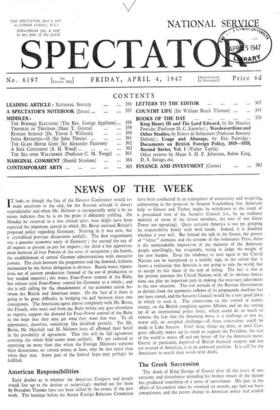American Responsibilities
Early doubts as to whether the American Congress and people would live up to the destiny so surprisingly marked out for them by President Truman have not been stilled by the events of the past week. The hearings before the Senate Foreign Relations Committee
have been conducted in an atmosphere of uncertainty and misgiving, culminating in the proposal by Senator Vandenberg that American help to Greece and Turkey might be withdrawn as the result of a procedural vote of the Security Council (i.e., by an ordinary majority of seven of the eleven members, the veto of one Great Power not operating). Quite certainly America is not yet grasping its responsibility firmly with both hands. Indeed, it is doubtful whether it ever will. But behind the talk in the Senate, the protest of " leftist " elements and the screams of the isolationist Press, there is the unmistakable impression of the majority of the American people unwillingly, but resignedly, trying to judge the weight of the new burden. Even the tendency to turn again to the United Nations can be interpreted as a healthy sign, to the extent that it shows a realisation that America is not going to rule the-world, but to accept its fair share of the task of ruling. The fact is that at the present juncture the United Nations with all its obvious limita- tions can play an important part in making the necessary adjustment to the new situation. The real attitude of the Russian Government as distinct from the automatic reflexes of its propaganda machine has not been stated, and the Security Council would be a very good place in which to state it. The concessions on the control of atomic energy, on the British complaint against Albania, and on the setting up of an international police force, which could do so much to remove the fear that the American move is a challenge to war or, worse still, an accepted challenge—all these concessions could be made at Lake Success. Until these things are done, or until Con- gress officially makes up its mind to support the President, the rest of the world is worse off and not better off for the American move. Greece in particular, deprived of British financial support and not yet assured of American, is in an awkward position. It is still for the Americans to match their words with deeds.


































